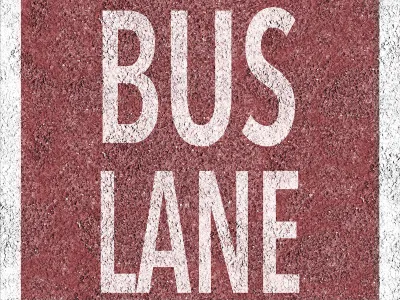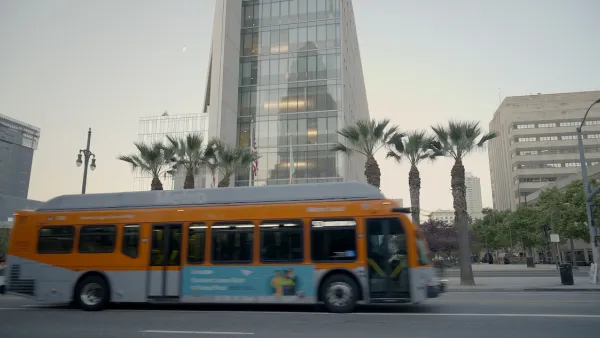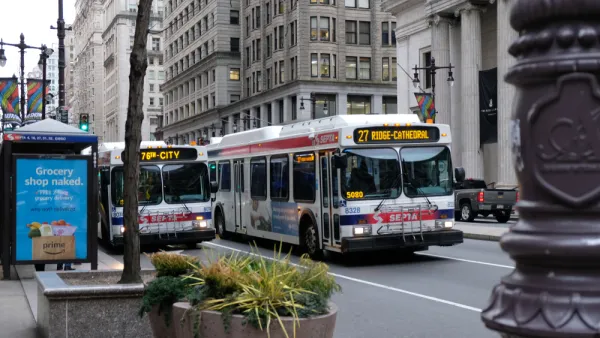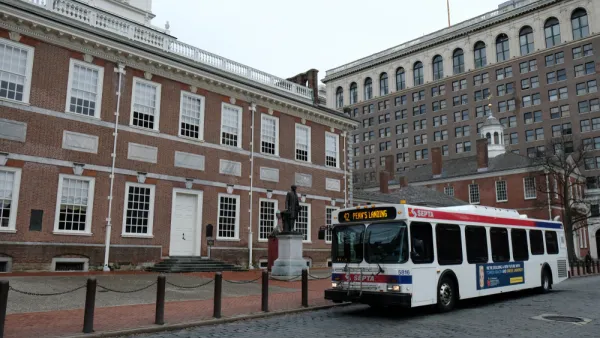A pilot program tested AI-powered cameras that monitored bus-only lanes for parked vehicles.

Windshield-mounted cameras on board buses operated by the Southeastern Pennsylvania Transportation Authority (SEPTA) caught vehicles blocking bus-only lanes 36,392 times in a 70-day period, reports Thomas Fitzgerald in The Philadelphia Inquirer.
The pilot automated enforcement program did not result in any tickets or warnings issued to drivers, but “The test documented the need for and feasibility of a permanent camera enforcement program, agency officials said.
In addition to facilitating faster and more reliable bus service, dedicated bus lanes improve passenger safety and accessibility. “Blockages of bus stops endanger passengers who have to step into traffic to board or disembark, SEPTA says; it is a particular problem for wheelchair users and other people with mobility issues.”
The article notes that the program exempted emergency responders and moving vehicles making legal right turns in designated areas. While supporters of automated enforcement say cameras make enforcement more equitable and prevent unnecessary confrontations with law enforcement, the technology has been criticized for failing to accurately identify vehicles and situations.
SEPTA is asking the city to permit a widespread automated enforcement program. “The agency believes that only a city ordinance would be required to authorize camera enforcement of parking violations. Using automated enforcement for moving violations in bus zones would require state legislation.”
FULL STORY: SEPTA cameras documented more than 36,000 vehicles blocking bus lanes and stops

National Parks Layoffs Will Cause Communities to Lose Billions
Thousands of essential park workers were laid off this week, just before the busy spring break season.

Retro-silient?: America’s First “Eco-burb,” The Woodlands Turns 50
A master-planned community north of Houston offers lessons on green infrastructure and resilient design, but falls short of its founder’s lofty affordability and walkability goals.

Delivering for America Plan Will Downgrade Mail Service in at Least 49.5 Percent of Zip Codes
Republican and Democrat lawmakers criticize the plan for its disproportionate negative impact on rural communities.

Test News Post 1
This is a summary

Test News Headline 46
Test for the image on the front page.

Balancing Bombs and Butterflies: How the National Guard Protects a Rare Species
The National Guard at Fort Indiantown Gap uses GIS technology and land management strategies to balance military training with conservation efforts, ensuring the survival of the rare eastern regal fritillary butterfly.
Urban Design for Planners 1: Software Tools
This six-course series explores essential urban design concepts using open source software and equips planners with the tools they need to participate fully in the urban design process.
Planning for Universal Design
Learn the tools for implementing Universal Design in planning regulations.
EMC Planning Group, Inc.
Planetizen
Planetizen
Mpact (formerly Rail~Volution)
Great Falls Development Authority, Inc.
HUDs Office of Policy Development and Research
NYU Wagner Graduate School of Public Service





























